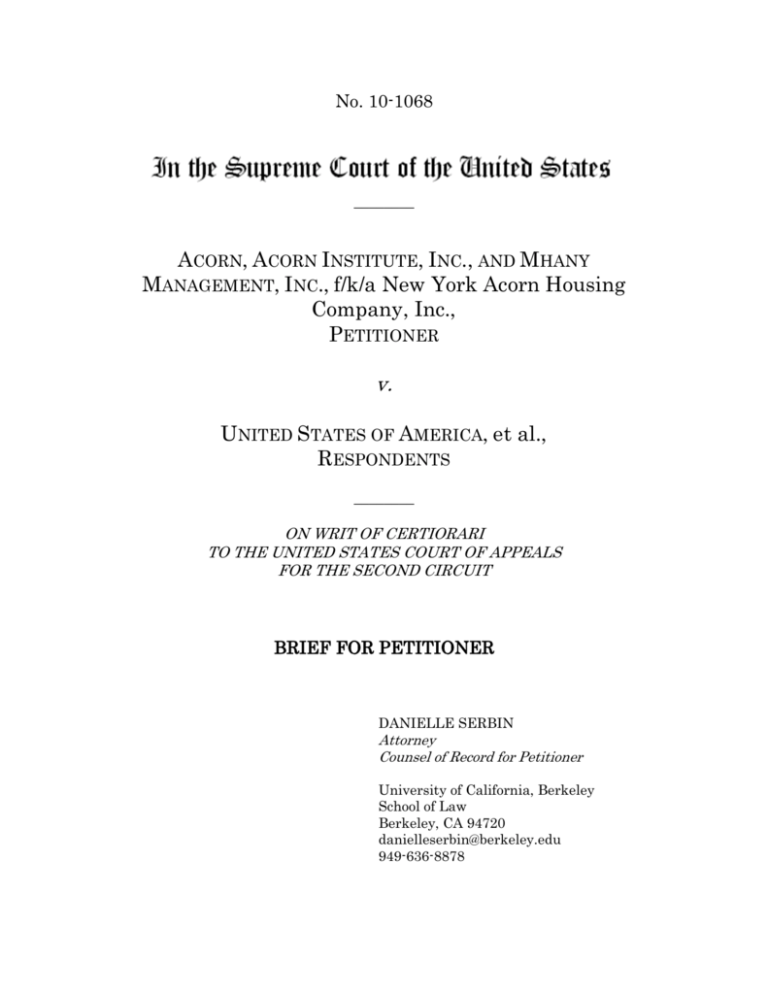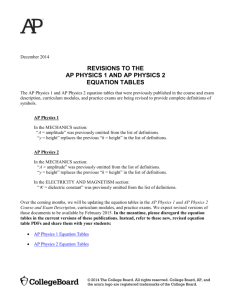2012 Best Petitioner Brief - Berkeley Law
advertisement

No. 10-1068 ________ ACORN, ACORN INSTITUTE, INC., AND MHANY MANAGEMENT, INC., f/k/a New York Acorn Housing Company, Inc., PETITIONER v. UNITED STATES OF AMERICA, et al., RESPONDENTS ________ ON WRIT OF CERTIORARI TO THE UNITED STATES COURT OF APPEALS FOR THE SECOND CIRCUIT BRIEF FOR PETITIONER DANIELLE SERBIN Attorney Counsel of Record for Petitioner University of California, Berkeley School of Law Berkeley, CA 94720 danielleserbin@berkeley.edu 949-636-8878 Question Presented Does a congressional ban on federal funds and contracting to one specific, named corporation and all of its subsidiaries, affiliates, and undefined “allied corporations” constitute a bill of attainder. i TABLE OF CONTENTS TABLE OF AUTHORITIES………………….………………….………………..…..…………iv STATEMENT OF FACTS AND PROCEDURE BELOW………………………………………………………………………..…...…..1 SUMMARY OF ARGUMENT………………….…………………………………....…………...…….8 ARGUMENT………………….………………….………………….………………11 I. II. The Prohibition Against Bills of Attainder Applies Equally to Individuals and Corporations………………….………………………….……….……...…12 A. This Court has Indicated that the Attainder Clauses Apply to Corporations and All Lower Courts Addressing the Issue have Held or Assumed that the Clause Applies to Corporations………………….…………………………..……….…13 B. The History and Purpose behind the Bill of Attainder Clauses Support Applying the Clauses to Corporations….………………….……………………..……………13 The Appropriations Laws Are Unconstitutional Bills of Attainder…………………………………….……….………….………..…15 A. The Appropriations Laws Amount to Punishment under the Historical Test………………….………………………………...…………..…...15 1. The Appropriations Laws Punish ACORN and Its Affiliates for Exercising their Political Liberty………………….………………….…………………….17 2. The Provisions Mark ACORN with a Note of Infamy………………….………………….……………..…….19 3. The Appropriations Laws Effectively Prevent ACORN from Performing its Lawful Vocation–Providing Housing Services to Low Income Americans…………………...…...23 ii 4. B. C. Delivery of Punishment through Appropriations Laws Constitutes Punishment………………….………………….26 The Appropriations Laws Punish ACORN and Its Affiliates under the Functional Test………………….………………………………………...…….…27 1. The Appropriations Laws Create an Inescapable Bar to Federal Funding in Fiscal Year 2010……………….….….27 2. The Appropriations Laws’ Means are Unrelated to Congress’ Purported Goal of Protecting Taxpayer Dollars………………….………………….…………………...31 The Legislative History Establishes that Congress Intended the Appropriations Laws as Punishment………………………………………………….……...36 CONCLUSION………………….………………….…………………….…………40 iii TABLE OF AUTHORITIES Page(s) CASES Am. Commc’ns Ass’n v. Douds, 339 U.S. 382 (1950) ................................................................................................. 27 BellSouth Corp. v. FCC, 162 F.3d 678 (D.C. Cir. 1998) ..................................................................... 24, 25, 27 Citizens United v. FEC, 130 S. Ct. 876 (2010) ............................................................................................... 14 Club Misty, Inc. v. Laski, 208 F.3d 615 (7th Cir.2000) .................................................................................... 13 Con. Edison v. Pataki, 292 F.3d 338 (2d Cir. 2002) ............................................................................ passim Cummings v. Missouri, 71 U.S. 277 (1866) ........................................................................................... passim Dartmouth Coll. v. Woodward, 17 U.S. 518 (1819) ................................................................................................... 13 Davis v. Fed. Election Comm’n, 554 U.S. 724 (2008) ...................................................................................................... 31 Dehainaut v. Pena, 32 F.3d 1066 (7th Cir. 1994) ....................................................................... 23, 26, 32 Dent v. West Virginia, 129 U.S. 114 (1889) ................................................................................................. 23 DeVeau v. Braisted, 363 U.S. 144 (1960) ................................................................................................. 24 Ex parte Garland, 71 U.S. 333 (1866) ....................................................................................... 17, 18, 23 First Nat’l Bank of Boston v. Bellotti, 435 U.S. 765 (1978) ..................................................................................... 13, 14, 25 Fla. Youth Conservation Corps., Inc. v. Suttler, 2006 WL 1835967 No. 4:06CV275-RH/WCS (N.D. Fla. June 30, 2006) ............................................................................................................ 22, 26, 27 iv Flemming v. Nestor, 363 U.S. 603 (1960) ................................................................................................. 12 Foretich v. U.S., 351 F. 3d 1198 (D.C. Cir. 2003) ...................................................................... passim Hawker v. People of N.Y., 170 U.S. 189 (1898) ................................................................................................. 24 Helicopteros Nacionales de Colom., S.A. v. Hall, 466 U.S. 408 (1984) ........................................................................................... 14, 15 Joint Anti-Fascist Comm. v. McGrath, 341 U.S. 123, 142 (1951) ........................................................................................ 20, 21 Marshall v. Barlow’s, Inc., 436 U.S. 307 (1978) ................................................................................................. 14 Metro. Life Ins. Co. v. Ward, 470 U.S. 869 (1985) ................................................................................................. 14 Navegar, Inc. v. United States, 192 F.3d 1050 (D.C. Cir. 1999) ......................................................................... 13, 37 Nixon v. Adm’r of Gen. Servs., 433 U.S. 425 (1977) ......................................................................................... passim Pierce v. Carskadon, 83 U.S. 234 (1872) ................................................................................................... 17 Planned Parenthood of Central North Carolina v. Cansler, 804 F. Supp. 2d 482 (M.D.N.C. 2011) ............................................................. passim Planned Parenthood of Mid. Mo. & E. Kan. v. Dempsey, 167 F.3d 458 (8th Cir. 1999) ....................................................................... 27, 28, 29 Plaut v. Spendthrift Farm, Inc., 514 U.S. 211 (1995) ................................................................................................. 13 SBC Commc’ns, Inc. v. FCC, 154 F.3d 226 (5th Cir.1998) ............................................................................ passim Schellong v. INS, 805 F.2d 655 (7th Cir. 1986) ................................................................................... 16 SeaRiver Mar. Fin. Holdings, Inc., v. Mineta, 309 F.3d 662 (9th Cir. 2002) ................................................................................... 13 v Selective Serv. Sys. v. Minn. Pub. Interest Research Group., 468 U.S. 841 (1984) ......................................................................................... passim South Carolina v. Katzenbach, 383 U.S. 301 (1966) ............................................................................................. 8, 13 United States v. Brown, 381 U.S.437 (1965) .......................................................................................... passim United States v. Lovett, 328 U.S. 303 (1946) ......................................................................................... passim United States v. Martin Linen Supply Co., 430 U.S. 564 (1977) ................................................................................................. 14 United States v. Morton Salt Co., 338 U.S. 632 (1950) ................................................................................................. 14 Wilson v. United States, 221 U.S. 361 (1911) ................................................................................................. 14 STATUTES AND REGULATIONS U.S. Const. Art. I, §§ 9-10 ........................................................................................ 8, 11 2 C.F.R. Ch. 1, Part 180, 180.705 ................................................................................ 35 Text of appropriations laws ....................................................................................... A-1 OTHER AUTHORITIES 154th Congressional Record...........................................................................................5 155th Congressional Record................................................................................. passim CONG. RESEARCH SERVICE MEMORANDUM TO HOUSE JUD. COMM. RE ACORN (111th Cong., Mar. 15, 2010) ........................................................................ 8, 30, 40 CONG. RESEARCH SERVICE REPORT ON ACORN ACTIVITIES CONCERNING HOUSING (111th Cong.,Oct. 30, 2009) .......................................................................... 1, 25, 26 John Atlas, Seeds of Change: The Story of ACORN, America’s Most Controversial Antipoverty Community Organizing Group (Jun. 28, 2010). .................................................................................................. 22, 26 vi REPORT ON THE PROPOSED “DEFUND ACORN” ACT AND RELATED LEGISLATION: ARE THEY BILLS OF ATTAINDER? (111th Cong., Nov. 30, 2009)................................................................................... 33 Scott Harshbarger and Amy Crafts, An Independent Governance Assessment of ACORN: the Path to Meaningful Reform (Dec. 7, 2009) ................................................................................................... passim STAFF HOUSE COMMITTEE ON GOVERNMENT REFORM, ACORN POLITICAL MACHINE TRIES TO REINVENT ITSELF (112th Cong., Apr. 1, 2010) .......................................................................................7 STAFF HOUSE COMMITTEE ON GOVERNMENT REFORM, IS ACORN INTENTIONALLY STUCTURED AS A CRIMINAL ENTERPRISE? (111th Cong., July 23, 2009) ........................................................................... 2, 4, 39 U.S. GOV’T ACCOUNTABILITY OFFICE, PRELIMINARY OBSERVATIONS ON FUNDING, OVERSIGHT, AND INVESTIGATIONS AND PROSECUTIONS OF ACORN OR POTENTIALLY RELATED ORGANIZATIONS (June 14, 2010) ................................................................................................ passim William A. Fletcher, A Historical Interpretation of the Eleventh Amendment: A Narrow Construction of an Affirmative Grant of Jurisdiction Rather Than A Prohibition Against Jurisdiction, 35 Stan. L. Rev. 1033, 1100 (1983) ......................................................................... 14 vii STATEMENT OF FACTS AND PROCEDURE BELOW The Association of Community Organizations for Reform Now (“ACORN”) and its affiliated corporations (collectively “ACORN and its affiliates” or “ACORN”) are progressive non-profit corporations committed to organizing low-income and minority persons to achieve social justice. (Record at 3). Before disbanding in spring 2010, ACORN had 500,000 members in 75 cities. (Id.). Founded in 1970, “ACORN evolved from a grassroots, communitybased organization with a mission of advocacy for the poor and powerless” into “a major national entity both in scope and ambition.”1 ACORN has helped low-income Americans with “citizen engagement,” “political mobilization,” “voter registration,” and “foreclosure prevention.” Harshbarger at 5-6. ACORN and ACORN affiliates also provide housing-related programs for low-income individuals and families. For example, in 2006, ACORN Housing Corporation (AHC) “secured over $140 million in construction financing to develop 735 new units of affordable housing in Houston, Phoenix, Chicago, and New York.” CONG. RESEARCH SERV., 111TH CONG., REPORT ON ACORN ACTIVITIES CONCERNING HOUSING 1 (Oct. 30, 2009) (hereafter “CRS Housing Report”). Scott Harshbarger and Amy Crafts, An Independent Governance Assessment of ACORN: the Path to Meaningful Reform, 5 (Dec. 7, 2009) (unpublished internal report), available at http://www.proskauer.com/files/uploads/report2.pdf. 1 1 ACORN and affiliates have a long history of supporting Democratic political candidates and issues. For example, during the 2008 primaries, the Obama campaign employed ACORN-affiliate Campaign Services, Inc. for “get-out-the vote” efforts. STAFF H. COMM. ON GOV. REFORM, 111TH CONG., IS ACORN INTENTIONALLY STUCTURED AS A CRIMINAL ENTERPRISE?, 10 (July 23, 2009) (Hereafter “Oversight Comm. Report I”). Prior to the passage of the appropriations laws at issue in this case, ACORN received 10% of its funding from federal grants. (R. at 4). Between fiscal years 2005 and 2009, ACORN and its affiliates received an estimated $40.4 million in federal grants.2 A Government Accountability Office (GAO) Report determined that ACORN directed 96% of the funds from these grants to various housing-related initiatives. See GAO Report at 8-13. 2008-2009 Media Coverage Two prominent media stories published between 2008 and summer 2009 resulted in “serious public scrutiny” surrounding ACORN. (R. at 5). The first story involved an embezzlement scheme and its subsequent cover-up. “In 1999 and 2000, Dale Rathke, the brother of ACORN’s founder Wade Rathke, embezzled nearly $1 million from the organization.” (R. at 5). A “small group of executives decided to keep the information from almost all U.S. GOV’T ACCOUNTABILITY OFFICE, WASHINGTON, D.C., PRELIMINARY OBSERVATIONS ON FUNDING, OVERSIGHT, AND INVESTIGATIONS AND PROSECUTIONS OF ACORN OR POTENTIALLY RELATED ORGANIZATIONS 7 (June 14, 2010) (hereafter “GAO Report”). Available at http://www.gao.gov/new.items/d10648r.pdf. 2 2 of the group’s board members and not to alert law enforcement.” (Id.). The Rathke family agreed to repay the amount in exchange for confidentiality. (Id.). The embezzlement remained secret from the majority of ACORN leaders until a whistleblower publicized the information in June 2008. (See id.). When ACORN leadership learned of the embezzlement, it terminated Wade Rathke and “pursued a significant effort to evaluate and reform its financial and governance structures.” Harshbarger at 7. The second set of media stories revolved around allegations of ACORN’s connection to voter registration fraud. (R. at 5). Between October 2008 and May 2009, two ACORN workers were convicted of voter registration fraud. (Id.). In response, ACORN developed “good governance policies” to address weaknesses in management, but underwent further public scrutiny when a series of “hidden camera” videos showing interactions between ACORN employees and apparently unsavory people surfaced in summer 2009. (Id.). Conservative activists James O’Keefe and Hannah Giles “visited eight ACORN or ACORN Housing offices during July and August 2009, pretending to seek assistance with illegal matters.” Harshbarger at 11. “The publicly released versions of the videos show ACORN or ACORN Housing employees apparently willing to offer ways to effect illegal schemes involving tax advice, misuse of public funds and illegal and child trafficking.” Id. Only edited versions of the videos were made public. Id. The videos triggered “a period of intense coverage and commentary in traditional and social media.” Id. 3 The Appropriations Laws and Proceedings Below Against this background, some members of Congress began taking notice of ACORN. On April 1, 2009, Congressman Darrell Issa, ranking member of the House Committee on Oversight and Government Reform, published an 88-page report entitled “Is ACORN Intentionally Structured as a Criminal Enterprise?”, which was later read into the House record. 155 Cong. Rec. S9309 (daily ed. Sept. 14, 2009) (statement of Sen. Johanns). The report accused ACORN of many criminal and civil wrongdoings including conspiracy to defraud the United States, falsifying filings to the Internal Revenue Service and the Department of Labor, and violating the Fair Labor Standards Act and ERISA. Oversight Comm. Report I at 4. It further alleged that ACORN was guilty of an elaborate scheme of voter registration fraud. Id. at 7. The Report also criticized ACORN for supporting Democratic candidates including Barack Obama. Id. at 52. Following the Oversight Committee Report and the public scrutiny ACORN endured between 2008 and 2009, certain members of Congress proposed defunding the group. These representatives accused ACORN a number of serious crimes on the floors of the House and Senate. Congressman Issa called ACORN’s activities “illegal schemes too unseemly to discuss in this [the House] chamber.” 155. Cong. Rec. H9675 (daily ed. Sept. 17, 2009). Congresswoman Bachmann blamed ACORN for “educating individuals that they should take their money and bury it in a tin can in the 4 backyard rather than paying taxes.” 155 Cong. Rec. H9946, H9952 (daily ed. Sept. 24, 2009). And Congressman King proclaimed that he could not draw any distinction between an “ACORN shakedown, a Mafia shakedown, or a shakedown that might come from Hugo Chavez or some strongman in some other country.” Id. at H9950. Less than 0.001% of federal funding provided to ACORN and affiliates between 2005 and 2009 went to its voter registration programs.3 See GAO Report at 8-13. Yet one of the most common accusations levied against the group by members of Congress regarded its alleged connection to voter registration fraud. For example, Congressman King stated that Democrats and ACORN had made a “concerted effort to undermine the integrity of the ballot box,” and alleged that there were “400,000 fraudulent voter registrations turned in by ACORN.” 155 Cong. Rec. at H9946, H9948. Members of Congress also criticized ACORN for promoting a progressive agenda and maintaining close ties to Democratic candidates and President Obama. For example, Congresswoman Foxx called ACORN and affiliates “militant left-wing community activist groups”; “radical allies” of the Democratic Party who provided “illegal help in getting Democrats elected to office.” 154 Cong. Rec. H10281, H10282 (daily ed. Sept. 27, 2008) (internal quotations omitted). Out of $40.4 million granted to ACORN between 2005 and 2009, $33,750 went to voter registration efforts. See GAO Report at 8-13. 3 5 Other members of Congress disagreed with their colleagues’ treatment of ACORN. For example, Senator Leahy characterized the efforts to defund ACORN as “score-at-any-price partisanship.” 155 Cong. Rec. S9541–42 (daily ed. Sept. 17, 2009). Senator Durbin also protested the calls to defund ACORN, stating that Congress’ actions were akin to a “summary execution order” punishing “an entire organization because of the sins or crimes of a limited number of employees.” 155 Cong. Rec. S10181, 10211 (daily ed. Oct. 7, 2009). In Fall 2009, Congress passed the first of five laws depriving ACORN of federal funding. (R. at 6). This was “the first time Congress had denied federal funding to a specifically named person or organization in this way.” (Id. at 36). Congress defunded ACORN as part of a temporary, “stop gap” appropriations law, the Continuing Appropriations Resolution. (Id. at 6). Section 163 mandated that no federal funds be provided to ACORN or any of its affiliates, subsidiaries, or allied organizations.4 (Id. at 9). The Resolution was in effect between October 1, 2009 and December 18, 2009. (Id. at 6). ACORN and its affiliates filed suit in November 2009, challenging Section 163 as a bill of attainder. (R. at 7). They requested that the district court enjoin the relevant government officials from enforcing the law. (Id.). On December 11, 2009, the district court granted ACORN’s request for a preliminary injunction, concluding that there was a likelihood of success on the bill of attainder claim. (Id.). 4 Appendix A contains the full text of each challenged statutory provision. 6 During the pendency of the district court litigation, “Congress passed appropriations laws for fiscal year 2010, which President Obama signed into law.” (R. at 7). One section of the provisions included language identical to Section 163. (Id.). Another four sections “similarly excluded ACORN and its ‘subsidiaries’ from federal funding.” (Id.). Additionally, Section 535 directed “the GAO to conduct a review and audit of federal funds received by ACORN” or ACORN affiliates to determine whether and to what extent the nonprofits misused federal funds. (Id. at 8). ACORN then filed an amended complaint challenging the appropriations laws and the then-expired Section 163 (collectively referred to as “appropriations laws” or “laws”). (R. at 8). On March 10, 2010, the district court held that the appropriations laws were unconstitutional bills of attainder, and granted ACORN’s request for a permanent injunction. (Id.) The government appealed, and the Second Circuit reversed the district court’s determination. 618 F.3d 125. ACORN now appeals that judgment and requests that this Court reinstate the permanent injunction. Aftermath of the Appropriations Laws On the brink of bankruptcy, ACORN dissolved in late March 2010. STAFF H. COMM. ON GOV. REFORM, 112TH CONG., ACORN POLITICAL MACHINE TRIES TO REINVENT ITSELF 1 (Apr. 1, 2010). Though certain ACORN-affiliates changed their names and remained in operation, ACORN ceased to exist. Id. at 1-2. 7 At the same time, independent reports regarding the widespread allegations of voter registration fraud and misuse of federal funds largely exonerated ACORN. The GAO report commissioned by Congress found no mismanagement of federal grant money provided to ACORN and its affiliates. GAO Report at 6. An independent report produced by attorney Scott Harshbarger determined that while ACORN had “longstanding management weaknesses,” he “did not find a pattern of intentional, illegal conduct by ACORN staff.” Harshbarger at 3. A Congressional Research Service (CRS) report found no evidence of registration fraud and no instances where ACORN “violated the terms of federal funding in the last five years.” CONG. RESEARCH SERV., 111TH CONG., MEMORANDUM TO HOUSE JUD. COMM. RE ACORN 1 (Mar. 15, 2010) (hereafter “CRS ACORN Memo”). SUMMARY OF ARGUMENT The Court should reverse the Second Circuit. The appropriations laws are unlawful bills of attainder because they punish ACORN and its affiliates. The Constitution prohibits both Congress and the states from passing bills of attainder–bills that legislatively determine guilt by singling out a specific person, group, or entity for punishment. U.S. Const. Art. I, §§ 9-10. As a preliminary matter, the prohibition against bills of attainder applies equally to corporations and individuals. Though this Court has never had the opportunity to rule on the matter, it has indicated that the Attainder Clauses apply to corporations. See South Carolina v. Katzenbach, 383 U.S. 8 301, 324 (1966). And the purpose and history behind the prohibition support applying it to corporations. The appropriations laws punish ACORN under the historical, functional, and motivational tests. The laws are akin to punishment historically levied against those with bills of attainder for three reasons. First, Congress passed the appropriations laws as punishment for ACORN’s political beliefs and activities. Statements from members of Congress demonstrate their disapproval of ACORN’s progressive agenda and support for Democratic candidates. Second, the laws mark the group with a note of infamy. After the laws, ACORN became a pariah. It lost support from longtime private donors and ultimately disbanded. Third, the appropriations laws effectively prevent ACORN from practicing a key area of its employment. Ninety-six percent of federal funds provided to ACORN and its affiliates went to support their housing related efforts. Without this money, the groups are effectively disqualified from continuing these efforts. The appropriations laws punish ACORN under the functional test because Congress’ purported nonpunitive purpose in passing the bills, protecting taxpayer dollars from misuse, is unrelated to the means used to achieve this goal. Notably, though Congress requested that the Government Accountability Office conduct a study to determine whether ACORN misused federal funds, it did not predicate denial of funding on the results of the report. Further, the bills are both overinclusive and underinclusive. They are 9 overinclusive because they punish ACORN and all of its affiliates, no matter whether those groups actually misused federal funds. They are underinclusive because they do not punish all organizations allegedly involved in misusing federal dollars equally, but single out only ACORN and affiliates. Finally, the legislative history demonstrates that Congress intended these laws as punishment. A cadre of Republican representatives attacked ACORN on the floors of Congress as guilty of the most sensational crimes, including voter registration fraud, child prostitution and illegal immigration. The House Oversight Committee published an 88-page report entitled “Is ACORN Intentionally Structured as a Criminal Enterprise?”, which similarly claimed that ACORN was guilty of many civil and criminal wrongdoings. Notably, Congress did not wait for a judicial determination of guilt. In fact, the truth about ACORN is far less salacious–a number of independent reports produced after the laws’ passage largely exonerated ACORN. But the legislative history demonstrates that Congress did not care about ACORN’s guilt or innocence. Rather, it seized upon largely false yet widely publicized negative media stories about ACORN as an opportunity to punish the boldly progressive ally of Democratic candidates and low-income Americans. This Court should not allow Congress to punish a group merely because of its political beliefs and activities. 10 ARGUMENT The Constitution commands that no “Bill of Attainder or ex post facto Law shall be passed.” U.S. Const. Art. I §§ 9-10. Article I, Section 9 applies the restriction to Congress; Section 10 applies the same restriction to the states. A bill of attainder is “a law that legislatively determines guilt and inflicts punishment upon an identifiable individual without . . . the protections of a judicial trial.” Nixon v. Adm’r of Gen. Servs., 433 U.S. 425, 468 (1977). The provision against bills of attainder “was intended not as a narrow, technical . . . prohibition, but rather as an implementation of the separations of powers, a general safeguard against legislative exercise of the judicial function.” United States v. Brown, 381 U.S.437, 442 (1965). An unconstitutional bill of attainder has three elements: (1) “specification of the affected persons,” (2) “punishment,” and (3) “lack of judicial trial.” Selective Serv. Sys. v. Minn. Pub. Interest Research Group., 468 U.S. 841, 846-47 (1984). In the proceeding below, Defendants did not challenge the district court’s determination that elements one and three were satisfied. (R. at 14). The appropriations bills plainly meet these two requirements: each of the disputed laws specifically named ACORN and its affiliates, and ACORN had not been tried in court for any alleged criminal or civil wrongs before the President signed the bills into law. (See id.). 11 This case turns on the second element, whether the appropriations laws punish ACORN and its affiliates. This determination involves three inquiries: (1) “whether the challenged statute falls within the historical meaning of legislative punishment” (the historical test of punishment); (2) “whether the statute, viewed in terms of the type and severity of the burdens imposed, reasonably can be said to further nonpunitive legislative purposes” (the functional test of punishment); and (3) “whether the record evinces a congressional intent to punish” (the motivational test of punishment). Selective Service Sys., 468 U.S. at 852 (internal quotations omitted). A statute “need not fit all three factors to be considered a bill of attainder.” Con. Edison v. Pataki, 292 F.3d 338, 350 (2d Cir. 2002). Rather the Court weighs all three factors together in reaching its determination. Id. And each attainder case “turns on its own highly particularized context.” Flemming v. Nestor, 363 U.S. 603, 616 (1960). The particular facts of this case establish that the appropriations laws punish ACORN under all three tests. I. The Prohibition Against Bills of Attainder Applies Equally to Individuals and Corporations5 The Constitution safeguards corporations as well as individuals against unlawful bills of attainder. Precedent, history, and the meaning behind the Attainder Clauses support this conclusion. In the proceedings below, Defendants conceded that the Attainder Clauses protect corporations as well as individuals. (R. at 35, fn. 8). But they “retained the right to challenge the applicability of the Bill of Attainder Clause to corporations in any appellate proceedings in this case.” (Id.). 5 12 A. This Court has Indicated that the Attainder Clauses Apply to Corporations and All Lower Courts Addressing the Issue have Held or Assumed that the Clause Applies to Corporations Though never directly ruling on the matter, this Court has indicated that the Bill of Attainder Clauses apply to corporations. The Court has stated that the prohibition provides “protections for individual persons and private groups,” South Carolina v. Katzenbach, 383 U.S. 301, 324 (1966) (emphasis added), and that a bill of attainder may target a “single individual or firm.” Plaut v. Spendthrift Farm, 514 U.S. 211, 239 n. 9 (1995) (emphasis added). Further, all lower courts faced with the question have either held that the Attainder Clauses protect corporations or assumed so. See Con. Ed., 292 F.3d at 329 (holding that the Clauses apply to corporations); See also, e.g., Club Misty, Inc. v. Laski, 208 F.3d 615, 617 (7th Cir.2000) (assuming without deciding that the Clauses apply to corporations); Navegar, Inc. v. United States, 192 F.3d 1050, 1065 (D.C. Cir. 1999) (same); SBC Commc’ns, Inc. v. FCC, 154 F.3d 226, 234 (5th Cir.1998) (same); SeaRiver Mar. Fin. Holdings, Inc., v. Mineta, 309 F.3d 662, 668 (9th Cir. 2002) (same). B. The History and Purpose behind the Bill of Attainder Clauses Support Applying the Clauses to Corporations A corporation is “an artificial being, invisible, intangible, and existing only in contemplation of law.” Dartmouth Coll. v. Woodward, 17 U.S. 518, 636 (1819). However, states are not free to “define the rights of their creatures without constitutional limit.” First Nat’l Bank of Boston v. Bellotti, 435 U.S. 765, 778 (1978). As such, corporations enjoy many constitutional rights. See 13 Citizens United v. FEC, 130 S. Ct. 876 (2010) (freedom of speech); Helicopteros Nacionales de Colom., S.A. v. Hall, 466 U.S. 408, 413-419 (1984) (due process); Metro. Life Ins. Co. v. Ward, 470 U.S. 869, 881 n. 9 (1985) (equal protection); United States v. Martin Linen Supply Co., 430 U.S. 564 (1977) (double jeopardy); Marshall v. Barlow’s, Inc., 436 U.S. 307 (1978) (search and seizure). But corporations cannot assert purely personal rights. See Wilson v. United States, 221 U.S. 361 (1911) (self-incrimination); United States v. Morton Salt Co., 338 U.S. 632 (1950) (privacy). “Whether or not a particular guarantee is purely personal” and unavailable to corporations “depends on the nature, history, and purpose of the particular constitutional provision.” Bellotti, 435 U.S. at 779, n. 14. “[B]ills of attainder historically ha[ve] targeted corporations as well as natural persons.” Con. Edison, 292 F. 3d at 348. For example, “several English statutes imposed disabilities of English boroughs.” Id. (citing 1 & 2 Geo. 4, c. 47 (Eng. 1821)). Historically, municipalities and counties were considered analogous to private corporations. William A. Fletcher, A Historical Interpretation of the Eleventh Amendment: A Narrow Construction of an Affirmative Grant of Jurisdiction Rather Than A Prohibition Against Jurisdiction, 35 Stan. L. Rev. 1033, 1100 (1983) (“For purposes of legal category and consequence in 1793, a municipal corporation was seen as more closely analogous to a private corporation than to a state”). 14 Moreover, the purposes animating the Attainder Clauses support their application to corporations. The Clauses are a “bulwark against tyranny,” Brown, 381 U.S. at 442; a protection against “special legislative acts which take away life, liberty, or property . . . because the legislature thinks them guilty of conduct which deserves punishment.” United States v. Lovett, 328 U.S. 303, 1079-80 (1946). Thus the provision is closely related to two other constitutional prerogatives–procedural due process and separation of powers. See Con. Edison, 292 F.3d at 347-48; Brown, 381 U.S. at 442. Corporations have the right to procedural due process, Helicopteros, 466 U.S. at 413-419, and may raise separation of powers challenges. See, e.g., SBC, 154 F. 3d at 244-245. II. The Appropriations Laws Are Unconstitutional Bills of Attainder A. The Appropriations Laws Amount to Punishment under the Historical Test The historical test asks whether a statute “imposes the sorts of deprivations and disabilities so disproportionately severe and so inappropriate to nonpunitive ends that they unquestionably have been held to fall within the proscription” of the Bill of Attainder Clauses. Con. Edison, 292 F.3d at 351. “In England a bill of attainder originally connoted a parliamentary Act sentencing a named individual or identifiable members of a group to death.” Nixon, 433 U.S. at 473. But the Attainder Clauses broadly proscribe both what were defined as bills of attainder as well as bills of pains and penalties 15 in England. Id. at 474. Bills of pains and penalties were “generally addressed to persons considered disloyal to the Crown or State,” and “consisted of a wide array of punishment” including “prisonment, banishment, and punitive confiscation of property by the sovereign.” Id. “Our country’s own experience with bills of attainder” broadened the scope of historical attainder to include legislative bars on specific vocations. Id. Punishments that are not “precisely identical” to the burdens historically recognized as punishment but which contain congruently punitive measures may meet the historical definition of punishment. Foretich v. U.S., 351 F. 3d 1198, 1219-1221 (D.C. Cir. 2003). For example, in Foretich, the D.C. Circuit held that a statute depriving a noncustodial father all visitation rights marked him with a “note of infamy” and therefore “would not be an inconsistent extension of the historical category.” Id. at 1220. But governmental action that is not akin to any of the historical punishments does not suffice. See id. So because “deportation has . . . never been considered [] punishment,” it does not pass the historical test. Schellong v. INS, 805 F.2d 655, 662 (7th Cir. 1986). The Court of Appeals erred when it determined that withholding of appropriations is not an historical form of punishment. (R. at 14-15). Rather, the appropriations laws fall under the historical definition of punishment because (1) they punish ACORN and its affiliates for exercising their political liberty; (2) they mark ACORN and its affiliates with a “note of infamy”; and 16 (3) they effectively disqualify ACORN and its affiliates from practicing a key area of their employment. 1. The Appropriations Laws Punish ACORN and Its Affiliates for Exercising their Political Liberty “The Bill of Attainder Clause has long been regarded as protecting unpopular individuals or groups from trial-by-legislature.” SBC, 154 F.3d at 251 (Smith, J., dissenting). In England, Parliament passed bills of attainder and pains and penalties “in times of rebellion, or gross subserviency to the crown, or of violent political excitements; periods, in which[ ] nations are most liable . . . to forget their duties, and to trample upon the rights and liberties of others.’” Cummings v. Missouri, 71 U.S. 277, 323 (1866) (quoting Story, Commentaries on the Constitution, § 1344). Thus with the Bill of Attainder Clauses, the Framers meant to protect the politically unpopular from the whims of Congress. See id. at 322. In all five cases where the Court held that disputed legislation constituted attainder, “the context of the Court’s ruling was protection of political liberty.” (R. at 36). Each of these laws was passed during a time of great national unrest–Reconstruction and the Cold War–and intended to punish members of an unpopular group. (See id.) Cummings v. Missouri, 71 U.S. 277, Ex parte Garland, 71 U.S. 333 (1866), and Pierce v. Carskadon, 83 U.S. 234 (1872) involved state and federal measures intended to punish ex-Confederates. Cummings concerned a 17 statute requiring Missouri clergymen to take an oath that they had never been a member of a group ‘‘inimical to the government of the United States.” 71 U.S. at 333. Noting that the Missouri legislature drafted the provision during the Civil War and in the midst of the “fierce passions which that struggle aroused,” the Court held that it was “beyond the competency of the state” to punish Cummings for his prior pro-Confederate sympathies. Id. at 322, 288; see also Garland, 71 U.S. at 367. Lovett and Brown involved congressional attempts to punish communists. Lovett concerned legislation depriving three named government employees and alleged subversives from further government employment. 328 U.S. at 304. Members of Congress had attacked plaintiffs as “unfit to hold a government position” due to their “beliefs and past actions.” Id. at 309. In Brown, the Court overturned a statute making it a crime for any member of a communist party to serve as an officer or employee of a labor union. 381 U.S. at 439. The Court held that the statute impermissibly penalized “members of a political group thought to present a threat to national security.” Id. at 453. Like plaintiffs in Lovett and Brown, statements from members of Congress demonstrate that Congress singled out ACORN because of its political beliefs. For example, Congressman Issa called ACORN a ‘‘criminal enterprise that helped Barack Obama get elected President.’’ (R. at 43). Congresswoman Foxx derided ACORN for its “far-left wing political agenda.” 18 155 Cong. Rec. H9946, H9949. She also disparaged ACORN for its ties to Democrats, stating that “Democrats want to . . . reward their radical allies at ACORN” for the nonprofit’s “illegal help . . . in getting [them] elected to office.” Id. Congressman King labeled President Obama “the star of ACORN” and its “lead chief organizer.” 155 Cong. Rec. H9946, H9952. As with the measures labeled unconstitutional bills of attainder by this Court, the media frenzy surrounding ACORN made 2009 a time of “violent political excitements” for the organization. See Cummings, 71 U.S. at 323. And like the communists and ex-Confederates in the bills described above, ACORN was extremely unpopular. Influenced by the negative media, Congress enacted the appropriations laws to single out ACORN because of its progressive agenda and allegiance to Democratic candidates and causes. Punishment of this sort–that sees Congress targeting the politically unpopular and denying them certain rights or privileges because of their unpopularity–is the exact sort of legislation that the Bill of Attainder Clauses were meant to protect against. See Cummings, 71 U.S. 277 at 323. 2. The Provisions Mark ACORN with a Note of Infamy a. Notoriety The early attainder cases “demonstrate that a statute will be particularly susceptible to invalidation as a bill of attainder where its effect is to mark specified persons with a brand of infamy or disloyalty.” Foretich, 351 F.3d at 1219. The effect of attainder at common law was to “set a note of 19 infamy” upon the accused; to make him “stained” and “blackened” as one “not fit to live upon the earth.” SBC, 154 F.3d at 235. In Lovett, the Court found it relevant that the appropriations law at issue was “aimed three named individuals,” and “stigmatized their reputation and seriously impaired their chance to earn a living . . ..”. 328 U.S. at 314. Similarly, in Foretich, the D.C. circuit held that a statute denying a noncustodial father any visitation rights marked him with a “note of infamy” and therefore “would not be an inconsistent extension of the historical category.” 351 F.3d at 1220. As a result of the act, Dr. Foretich was harassed by strangers and the media. Id. at 1209. A once-prominent oral surgeon, Foretich lost so much business that he had to shut down his practice and found it extremely difficult to obtain new employment. Id. Noting that Dr. Foretich was “no longer of any credit or reputation,” the court considered the act “not dissimilar” to the burdens traditionally deemed punitive. Id. at 1220. In his concurrence in Joint Anti-Fascist Comm. v. McGrath, Justice Black emphasized that the Attorney General’s branding certain organizations as communists unconstitutionally marked the groups with a note of infamy. 341 U.S. 123, 142 (1951). At issue in McGrath was whether certain groups signaled out by the Attorney General as communist organizations under the Hatch Act had standing to challenge defendants’ widely disseminated findings. Id. at 126-27, 143. The Court held that the plaintiffs had a legally redressable claim, but did not reach the merits. Id. at 126. In his concurrence, 20 Justice Black stated that “in the [then-existing]. . . climate of public opinion it appears certain that the Attorney General’s much publicized findings” were “the practical equivalents of . . . death sentences for any blacklisted organization.” As such, he reasoned that the measures possessed “almost every quality of bills of attainder.” Id. at 143-44. The concurrence stated that the Attorney General’s system “effectively punishe[d] many organizations and their members merely because of their political beliefs and utterances.” Id. at 144. The appropriations laws mark ACORN and its affiliates with a note of infamy. In his McGrath concurrence, Justice Black considered the effect of the Attorney General’s actions in light of the political milieu in early Cold War America. 341 U.S. at 143. Thus, the appropriations laws should be considered in light of the anti-ACORN fervor that existed in 2008 and 2009. Like the Hatch Act in McGrath, the challenged laws here blacklist ACORN by singling it out in five separate laws as unworthy of federal funding. See id. at 144. Also similar to McGrath, evidence from the legislative history demonstrates that Congress enacted the legislation “because of” ACORN’s “political beliefs and utterances.” See id. Moreover, much like the plaintiffs in Lovett and Foretich, ACORN has become a pariah as a result of the challenged statute. See Lovett 328 U.S. at 314; Foretich, 351 F.3d at 1220. Following the first appropriations measure, ACORN lost funding from long-time supporters including the Ford 21 Foundation and the Annie E. Casey Foundation.6 And in March 2010, ACORN announced it would be terminating its field operations due to loss of federal and other funding. GAO Report at 2. b. Statutory language need not mention guilt The court of appeals found relevant that “despite statements about ACORN’s guilt on the legislative floor, the appropriations laws themselves do not mention ACORN’s guilt in any way.” (R. at 16). But the “prohibition of the Constitution was intended to secure the rights of the citizen . . . under any form, however disguised.” Cummings, 71 U.S. at 278 (emphasis added). Clever drafting cannot save the appropriations bills. In a similar case, the Florida state legislature passed a statute specifically denying appropriation of state funds to a youth-oriented non-profit. Fla. Youth Conservation Corps., Inc. v. Suttler, 2006 WL 1835967 No. 4:06CV275-RH/WCS, at *1 (N.D. Fla. June 30, 2006). Like the appropriations laws, the statute there did not contain language naming the nonprofit guilty of wrongdoing. Id. at *2. But that did not stop the court from holding that the legislation constituted punishment, noting that “although the legislative enactment does not explicitly announce a finding of guilt on any specified charge, that is its obvious import[.]” Id. John Atlas, Seeds of Change: The Story of ACORN, America’s Most Controversial Antipoverty Community Organizing Group 244 (Jun. 28, 2010). 6 22 3. The Appropriations Laws Effectively Prevent ACORN from Performing its Lawful Vocation–Providing Housing Services to Low Income Americans “Disqualification from the pursuits of lawful avocation” may be “and often has been, imposed as a punishment.” Garland, 71 U.S. at 320. When a statute places restrictions on a person or entity’s employment in response to their prior objectionable actions, this amounts to punishment under the Attainder Clauses. See Cummings, 71 U.S. at 333. But not all legislative restrictions on employment are punishment. Acts that (a) set forth professional qualifications for employment; or (b) establish technical requirements for employment do not amount to punishment. Four of the five of the cases where the Supreme Court struck down laws as bills of attainder involved restrictions on employment.7 Circuit courts have similarly struck down legislation barring persons from employment due to congressional disapproval of their previous behavior. For example, in Dehainaut v. Pena, 32 F.3d 1066, 1070 (7th Cir. 1994), the Seventh Circuit held that an administrative rule indefinitely denying certain persons who had picketed against the government from FAA employment was punishment under the historical test. Conversely, when a statute’s effect is to make certain persons or entities ineligible for a position merely because they are not qualified for the job, this does not constitute punishment. For example, in Dent v. West 7 See supra Section II(A)(1). 23 Virginia, 129 U.S. 114, 128 (1889), the Court held that a state law requiring doctors to obtain certain educational qualifications was not a bill of attainder. Similarly, in Hawker v. People of N.Y., 170 U.S. 189, 205 (1898), the Court determined that a state law banning felons from practicing medicine was a mere job qualification and not punishment. See also DeVeau v. Braisted, 363 U.S. 144, 160 (1960) (New York statute disqualifying convicted felons from office in a waterfront labor organization was not punishment). A statute does not amount to punishment when it merely sets forth certain technical requirements for participating in a trade. In SBC, plaintiff telecommunication company challenged anti-competition provisions of the 1996 Telecommunications Act that limited its ability to enter the longdistance market. 154 F.3d at 233. The court noted that the act merely established a burden on SBC’s participation in its desired markets, which weighed against a finding of attainder. Id. at 243. Unlike the statutes in Hawker and SBC, the appropriations laws here neither set forth job qualifications nor technical requirements for employment. See Hawker, 170 U.S. at 205; SBC, 154 F.3d at 233. Rather, in denying ACORN federal funding for fiscal year 2010, Congress effectively prevented ACORN from employment in a key area of its business–its housing-related efforts.8 Although corporations cannot “hold a job” as a person can, when a statute amounts to a bar on a corporation’s key activities, this can amount to a prohibition on the corporation’s employment. For example, in BellSouth and 8 24 The vast majority of federal funds granted to ACORN came in the form of grants for housing-related projects. GAO Report at 6.9 According to data in the GAO report, an estimated 96% of the government funding provided to ACORN between fiscal years 2005 and 2009 contributed to ACORN’s housing-related efforts. See id. at 8-13. These efforts included providing housing counseling to low-income buyers; promoting economic independence for low-income tenants; assisting victims of housing discrimination with legal advice; and providing counseling to those facing foreclosure. Id. at 9. Providing housing counseling, services, and advocacy to America’s low income population is one of ACORN’s primary activities. ACORN Housing Corporation (AHC) “has been involved in providing housing counseling services to prospective homebuyers and troubled homeowners.” CRS Housing Report at 1-2. For example, “in 2006, AHC reported counseling 13,738 firsttime homeowners and refinancing 1,474 homeowners into more affordable mortgages.” Id. SBC, circuit courts considered whether bills proscribing corporate plaintiffs from certain telecommunication equipment markets constituted restrictions on employment. BellSouth Corp. v. FCC, 162 F.3d 678, 685-86 (D.C. Cir. 1998); SBC, 154 F.3d at 233-34, 37-43. Accord Bellotti, 435 U.S. at 783 (“Corporations and other associations, like individuals, contribute to the discussion, debate, and the dissemination of information and ideas”) (internal quotations omitted). The Report details sixteen federal grants to ACORN and its affiliates between fiscal years 2005 and 2009, amounting to $40.4 million. 9 25 Though not as explicit as the provision in Dehainaut, by depriving ACORN federal funding for its numerous housing-related initiatives, the effect of the appropriations laws was to disqualify ACORN from its vocation of providing housing services for the poor. See 32 F.3d at 1070. The laws took away millions that ACORN had expected to spend on its housing projects. See Atlas at 246. In fact, “because of the budget cutbacks, an ACORN firsttime homebuyer class in New York that enrolled one hundred people in September enrolled only seven people in October,” the month after Congress passed the first appropriations bill. Id. 4. Delivery of Punishment through Appropriations Laws Constitutes Punishment Finally, the fact that Congress chose to punish ACORN and its affiliates through appropriations laws does not weigh against finding punishment. (See R. at 15). As the Cummings Court stated, “the deprivation of any rights, civil or political, previously enjoyed, may be punishment . . ..”. 71 U.S. at 320. In Lovett, Congress passed an appropriations law stating that no appropriations could ever be used to pay certain specifically named government employees’ salaries. 328 U.S. at 312-13. This Court held that the fact that the punishment was performed through an appropriations bill made it “no less galling or effective than if it had been done by an Act which designated the conduct as criminal.” Id. at 316. And in Florida Youth, a district court struck down an appropriations measure excluding plaintiff nonprofit from state funds, calling the statute “legislative action very much akin 26 to the enactments that prompted the framers to include in the Constitution a prohibition on bills of attainder.” 2011 WL 1835967, at *1-2. B. The Appropriations Laws Punish ACORN and Its Affiliates under the Functional Test The functional test considers whether the challenged statute “viewed in terms of the type and severity of burdens imposed, reasonably can be said to further nonpunitive legislative purposes.” Nixon, 433 U.S. at 475. Congress’ nonpunitive goals must be “sufficiently clear and convincing.” BellSouth, 162 F.3d at 686. In examining the type and severity of statutory burdens, courts consider several factors. Statutes that erect inescapable bars constitute punishment. See Am. Commc’ns Ass’n v. Douds, 339 U.S. 382, 414 (1950). A “statute that burdens a particular” entity “must serve purposes that are not only nonpunitive, but also rational and fair.” Foretich, 351 F.3d at 1222 (citing Selective Serv. Sys., 468 U.S. at 854). “There must be a nexus between the legislative means and legitimate nonpunitive ends.” Id. And a “court must weigh the purported nonpunitive purpose of a statute against the magnitude of the burden it inflicts.” Id. (citing Nixon, 433 U.S. at 475-76). 1. The Appropriations Laws Create an Inescapable Bar to Federal Funding in Fiscal Year 2010 In Brown, this Court held that inescapability is not “an absolute prerequisite to a finding of attainder.” 381 U.S. at 457, fn. 32. Yet an “escape route” in a regulation or statute often weighs against attainder. See, e.g., SBC, 154 F.3d at 243; Planned Parenthood of Mid. Mo. & E. Kan. v. Dempsey, 27 167 F.3d 458, 465 (8th Cir. 1999). The appropriations laws erect an insurmountable bar to ACORN receiving federal funds in two ways. First, the laws apply to ACORN and all of its affiliates. Second, the laws set forth no terms by which ACORN may get around the funding ban. a. Affiliates In Brown, the Court held that an overinclusive law depriving not only proven government subversives, but all communists the opportunity for union leadership was impermissible punishment. 381 U.S. at 456. It stated that “even assuming that Congress had reason to conclude that some Communists would use union positions to bring about political strikes, it cannot automatically be inferred that all members share their evil purposes or participate in their illegal conduct.” Id. (internal quotations omitted). Lower courts have held that statutes depriving both a corporation and its affiliates of state funds constitute punishment under the functional test. In Dempsey, the court held that an appropriations bill denying organizations providing or promoting abortions state funds was not punishment. 167 F.3d at 465. Key to the court’s decision was the fact that plaintiff Planned Parenthood could qualify for family planning funds by “establishing an independent affiliate to perform abortion services.” Id. But in Planned Parenthood of Central North Carolina v. Cansler, 804 F. Supp. 2d 482, 49596 (M.D.N.C. 2011), the court held that a statute depriving state funding to Planned Parenthood was punishment under the functional test. The court 28 distinguished Dempsey because, unlike the statute there, the provision in Cansler deprived plaintiff Planned Parenthood and its affiliates of any opportunity to receive government funds. Id. As with the bill in Cansler, the appropriations laws deprive ACORN and its affiliates of government funding. 804 F. Supp. 2d at 495-96. At one point ACORN had 200 affiliated organizations engaged in a range of activities. (R. at 7). Evidence from the Oversight Committee reports and House and Senate debates demonstrates that Congress was chiefly concerned with misuse of federal funds associated with ACORN’s voter registration efforts. See, e.g., 155 Cong. Rec. at H9946, H9948. But none of ACORN’s numerous affiliates could overcome the funding ban, even if they were engaged in activities wholly unrelated to voter registration. b. Requirements Statutes that do not impose an insurmountable bar on a certain right or privilege but instead outline requirements for obtaining the privilege do not constitute punishment. SBC, 154 F.3d 226. As mentioned above, Congress and state legislatures often set forth certain requirements for employment that, once achieved, allow persons or corporations to participate in their desired vocations. See, e.g., SBC, 154 F.3d at 242-43. This is true for bills related to other privileges as well. For example, in Selective Service Systems, the fact those who failed to register for 29 the draft could overcome the ban on federal financial aid by registering late militated against the Court finding attainder. 468 U.S. at 853. The appropriations laws are inescapable. The district court held that the “unavailability of any means for ACORN to overcome the funding ban if the [GAO] investigation report is favorable underscores the lack of a connection between the burdens of the statute and Congress’ [sic] purpose in enacting it.” (R. at 39). Two government bodies, the GAO and the CRS, were tasked with researching a number of ACORN’s alleged wrongdoings, including its use of government funds, the videotape scandal, and voter registration fraud. Both reports largely exonerated ACORN and its affiliates. See GAO Report at 6; CRS ACORN Memo at 1. Yet Congress left ACORN no “out clause.” Hence, the appropriations laws stand in contrast to the statutory and regulatory requirements at issue in SBC and Selective Service Systems because the laws do not provide ACORN an opportunity to obtain federal funds by complying with certain statutory requirements. See 154 F.3d at 242-43; 468 U.S. at 853. In the proceedings below, Defendants argued that because the appropriations laws are presumably temporary (ie, the bills only proscribe allocating government funds to ACORN for one fiscal year), they are not punitive. (R. at 39). This is wrong for three reasons. First, as the district court noted, “ACORN is permanently deprived of the opportunity to apply for Fiscal Year 2010 funding. This may affect multi-year grants[.]” (R. at 38). 30 Second, the very nature of many of the laws challenged as bills of attainder is temporary; statutes and regulations are inherently subject to alteration. And if ACORN and its affiliates “are precluded from challenging a funding restriction on the basis of ‘temporariness’ of a year-long appropriations provision, [they] could never challenge a ban in an appropriations bill that was renewed indefinitely.”10 Finally, even a temporary measure can inflict irreparable harm. In this case the laws have, as evidenced by ACORN’s disbandment. As the district court stated, “if Congress determined that a person was to be jailed for a year and then released, the government would be hard pressed to argue that only a life sentence would constitute ‘punishment.’” (R. at 38). 2. The Appropriations Laws’ Means are Unrelated to Congress’ Purported Goal of Protecting Taxpayer Dollars A legitimately nonpunitive statute must have a rational and fair purpose. Nixon, 433 U.S. at 854. The nonpunitive purpose cannot be a façade. As such, a nexus must exist between the “legislative means and nonpunitive ends.” Foretich, 351 F.3d at 1222. A court must balance the alleged nonpunitive ends with the imposed burden to determine the law’s severity. Id. Because it “is not the severity of a statutory burden in absolute terms that The district court noted that this situation “would raise difficulties akin to those controversies the Supreme Court has found ‘capable of repetition yet evading review’ in the mootness context.” (R. at 39) (citing Davis v. Fed. Election Comm’n, 554 U.S. 724, 735 (2008)). 10 31 demonstrates punitiveness so much as the magnitude of the burden relative to the purported nonpunitive purposes of the statute.” Id. Congress’ alleged purpose behind the appropriations laws was to “ensure the effective expenditure of taxpayer dollars.” (R. at 18). But the means used expose this “purpose” as a post-hoc rationalization meant to cover up Congress’ true intent–punishing ACORN. a. The laws’ means are unrelated to their goals In Deheinaut, an adequate nexus existed between the disputed statute’s ends and its means. 32 F.3d at 1072-73. In that case, the government’s stated goal was protecting “the efficiency of the FAA’s operations.” Id. at 1072. The court found that the means there were adequately related to the goal, because prohibiting “the intermingling of controllers who had been fired for striking with those who had replaced them would interfere with the safety and efficiency of the FAA’s operations.” Id. Conversely, in Con. Edison no nexus existed between the statute’s purported nonpunitive purpose and its means. 292 F.3d at 354. There, the New York legislature passed a statute barring plaintiff power provider from increasing its customers’ service rates to pay for the costs of a power outage caused by its defective generator. Id. at 345. The statute’s purpose was to prevent Con Ed’s “ratepayers from being forced to bear the costs that the legislature viewed as negligently incurred.” Id. at 351. But had the outage occurred not because of Con Ed’s mistake, it could have passed on the costs of 32 the outage to its customers at substantially the same rates as the outage at issue there. Id. at 353. This fact belied the statute’s stated nonpunitive ends. Id. The court noted that the New York legislature had “made no attempt whatsoever to ensure that the costs imposed on Con Ed were proportional to the problems” the legislature sought to ameliorate. Id. at 354. In this case, there exists no nexus between Congress’ stated goal and the means used to achieve that goal. Indeed, evidence shows that depriving ACORN federal funding will not further Congress’ legislative purpose at all. A CRS report regarding various congressional proposals to defund ACORN found that “[w]hile the regulatory purpose of ensuring that federal funds are properly spent is a legitimate one, it is not clear that imposing a permanent government-wide ban on contracting with or providing grants to ACORN . . . fits that purpose, at least when the ban is applied only to ACORN and all its affiliates.” CONG. RESEARCH SERV., 111TH CONG., REPORT ON THE PROPOSED “DEFUND ACORN” ACT AND RELATED LEGISLATION: ARE THEY BILLS OF ATTAINDER? (Nov. 30, 2009). Further, like the New York legislature in Con. Edison, Congress made no attempt to ensure that the burden it imposed on ACORN was proportional to the laws’ stated goal of protecting taxpayer dollars. See 292 F.3d at 354. Though Section 535 called for a GAO report regarding whether or not ACORN misused federal funds (R. at 11), none of the appropriations laws took account of this. A nexus might have existed had Congress predicated 33 denial of funding on the results of the report and then stopped funding only those ACORN affiliates that did in fact misuse taxpayer dollars. But instead Congress denied funding to ACORN and all of its affiliates without regard for whether they misused federal dollars or not. b. The Appropriations Laws are Underinclusive The fact that Congress singled out ACORN alone among other corporations that have allegedly or truly misused federal funds underscores the appropriation laws’ punitive nature. While neither underinclusiveness nor specificity alone “render[s] a statute an unconstitutional bill of attainder,” “[n]arrow application of a statute to a specific person or class of persons raises suspicion, because the Bill of Attainder Clause is principally concerned with ‘the singling out of an individual for legislative prescribed punishment.’” Foretich, 351 F.3d at 1224 (quoting Selective Serv. Sys., 468 U.S. at 847) (emphasis in original). In Foretich, the fact that the disputed statute set a different standard for obtaining visitation rights in plaintiff’s case than for all other visitation cases demonstrated its punitive nature. 351 F.3d at 1223. By contrast, in Selective Service Systems, the Court observed that statute’s denial of “benefits to innocent as well as willful nonregistrants,” revealed its nonpunitive spirit. 468 U.S. at 855. The district court found it significant that the government offered no “unique reason to treat ACORN differently from other contractors accused of 34 serious misconduct.” (R. at 42). Congress has previously continued to fund corporations engaged in allegedly illegal activity. For instance, Congress continued to fund Halliburton subsidiary Kellogg, Brown, and Root (KBR) despite grave allegations of wrongdoing. Senator Durbin noted this during the debates surrounding the appropriations bills. 155 Cong. Rec. S10181. He informed the Senate that KBR “was found to have been involved in conduct that led to shoddy workmanship and which cost the life of an American soldier by electrocution,” and was “involved in supplying water supplies and sources to our troops that were dangerous.” 155 Cong. Rec. S10181. Yet Congress did not stop funding Halliburton or KBR. In fact, Halliburton was the United States’ sole-source contractor during the Iraq War. Id. c. Congress passed the appropriations laws despite less burdensome alternatives The punitive nature of the appropriations laws is further evidenced by the existence of less burdensome alternatives. See Con. Edison, 292 F.3d at 354. In Con. Edison, the existence of less burdensome alternatives helped demonstrate the legislature’s punitive intent. Id. In fact, a comprehensive regulatory scheme describes methods for suspending federal contracts. See, e.g., 2 C.F.R. Ch. 1, Part 180, 180.705. The district court correctly asserted that “the existence of these regulations militates against the need for draconian, emergency action by Congress.” (R. at 41). The relevant regulations allow for “immediate action” if “necessary to protect the public interest.” (Id.). Following these regulations would have 35 achieved Congress’ goal of denying ACORN funding without burdening ACORN with the considerable weight of being publicly signaled out as unworthy of federal dollars in five separate appropriations bills. See id. C. The Legislative History Establishes that Congress Intended the Appropriations Laws as Punishment Legislative history is probative of punitive intent. Nixon, 433 U.S. at 480. Indeed, the “major concern that prompted the bill of attainder prohibition” was “the fear that the legislature, in seeking to pander to an inflamed popular constituency, will find it expedient openly to assume the mantle of judge or worse still, the lynch mob.” Id. (internal quotations omitted). The legislative record “by itself is insufficient evidence for classifying a statute as a bill of attainder unless the record reflects overwhelmingly clear legislative intent to punish.” Con. Edison, 292 F.3d at 354. The congressional record in this case meets this high bar. Isolated statements expressing distrust or indignation do not suffice to establish punitive intent. In Selective Service Systems, the Court held that there was insufficient evidence in the legislative record evidencing Congress’ intent to punish those who had intentionally failed to register for the draft. 468 U.S. at 855. Rather, the bills’ “proponents indicated that they intended to regulate all nonregistrants,” not only intentional nonregistrants. Id. Though there were “several isolated statements expressing” indignation at intentional nonregistrants, the Court held that these statements did not amount to the “unmistakable evidence” required to establish punitive intent. 36 Id. at 855, n. 15; see also, e.g., SBC, 154 F.3d at 243-44 (scattered remarks from a bill’s sponsors demonstrating an intent to punish did not establish punitive intent); Nixon, 433 U.S. at 482 (statements by bill’s sponsors evinced nonpunitive purpose); Navegar, 192 F.3d at 1067-68 (same). In Lovett, the House Committee on Un-American Activities conducted secret trials of government employees it considered “subversive” following allegations of seditious activity made by certain members of Congress. 328 U.S. at 310-311. Congressman Dies, chairman of the Committee, wanted to pass a law depriving plaintiffs of their government salaries, and called them “irresponsible, unrepresentative, crack-pot, radical bureaucrats.” Id. The fact that Congress officially “deemed [plaintiffs] guilty” influenced the Court in determining that Congress’ clear intent was to punish. Id. at 314. The Cansler court found the legislative history of a bill depriving Planned Parenthood of state funding demonstrated a punitive intent. 804 F. Supp. 2d at 496. During legislative debates, state representatives derided plaintiff Planned Parenthood for its alleged connection to Margaret Sanger and the eugenics movement. Id. And a state senator declared that “97 percent of the pregnant women who go to a Planned Parenthood clinic are sold an abortion.” Id. The court noted that these statements were inaccurate. Id. It held that the legislative history supported the conclusion that the statute was passed to punish plaintiff for its alleged historical connection to the eugenics 37 movement and the alleged number of abortions it performed, “unrelated to any state-funded programs.” Id. Line after line of the legislative history establishes that Congress intended to punish ACORN and its affiliates with the appropriations laws. As mentioned, many representatives’ statements evinced a desire to penalize ACORN for its progressive agenda and ties to President Obama and the Democratic Party. Additionally, representatives alleged that ACORN and its affiliates were guilty of a laundry list of crimes. On the Senate and House floors, ACORN and its affiliates were accused of “child prostitution,” “shaking down lenders,” and “trafficking illegal aliens.” See 155 Cong. Rec. H994610129. They were called a “crooked bunch,” that “engaged in old-fashioned cronyism,” and a “corrupt and criminal organization,” belonging to the “criminal hall of fame.” See id. Congressman King stated that ACORN was “utterly corrupting [ ] society,” and that he could not “draw a moral distinction between an ACORN shakedown, a Mafia shakedown, or a shakedown that might come from Hugo Chavez or some strongman in some other country.” 155 Cong. Rec. at H9950. These numerous and negative statements far surpass the “scattered remarks” which did not suffice in SBC or Selective Service Systems. 154 F.3d at 243-44; 468 U.S. at 855. Further, certain representatives called out their colleagues for their attacks on ACORN. Senator Durbin declared, We have put ourselves . . . in the position of prosecutor, judge, and jury. . . . I went to one of these old-fashioned law schools. We believed 38 that first you have the trial, then you have the hanging. But, unfortunately, when it comes to this organization, there has been a summary execution order issued before the trial. 155 Cong. Rec. at 10211. The court of appeals incorrectly found it significant that “there [was] no congressional finding of guilt in this case.” (R. at 22) (emphasis in original). Yet as the court itself admitted, such a finding is not required. (R. at 23); see also Nixon, 433 U.S. at 480. While an official finding may be evidence of a punitive intent, see Lovett, 328 U.S. at 314, the absence of such a finding is of no import. Moreover, the House Oversight Committee Report, “Is ACORN a Criminally Structured Enterprise?” is akin to an official finding of guilt. While the Committee did not hold secret hearings as in Lovett, the Report claims to “find” ACORN guilty of a host of illegal activities. The Report listed the following violations as “Findings”: abuse of federal funds; fraud in the cover up of the Rathke embezzlement; violation of its Articles of Incorporation; failure to comply with IRS filing requirements; violating ERISA laws; misusing federal funds; employing convicted felons; engaging in fraudulent registrations; and performing illicit political lobbying. Oversight Committee Report I, at 6-7. The fact that members of Congress attacked ACORN on the floors of Congress for most salacious crimes without regard for whether these alleged acts were either truthful or related to the federal funding ACORN received 39 demonstrates punitive intent. Like defendant in Cansler, Congress was largely wrong about ACORN. 804 F. Supp. 2d at 496. Several independent reports found that ACORN had not misused federal funds. GAO Report at 6; Harshbarger at 3; CRS ACORN Memo at 1. And Congress’ attacks on ACORN had very little to do with the true relation between ACORN and the federal government. As mentioned, the vast majority federal funding provided to ACORN went to its housing initiatives, which were not at the center of the allegations levied against ACORN. See GAO Report at 8-13. Less than 0.001% of the funding went to Project Vote, which was accused of engaging in voter registration fraud by members of Congress. Id. No federal funds went to supporting any other alleged wrongdoings such as child prostitution or illegal immigration. See id. If Congress was truly concerned with protecting taxpayer dollars, it should have predicated any funding ban on the results of the GAO report. But instead, Congress used the appropriations laws to punish ACORN for wrongs it did not commit and that were largely unrelated to ACORN’s federal funding. CONCLUSION Petitioner respectfully requests that the Court reverse the decision of the Second Circuit. Respectfully submitted, Danielle Serbin February 15, 2012 40









